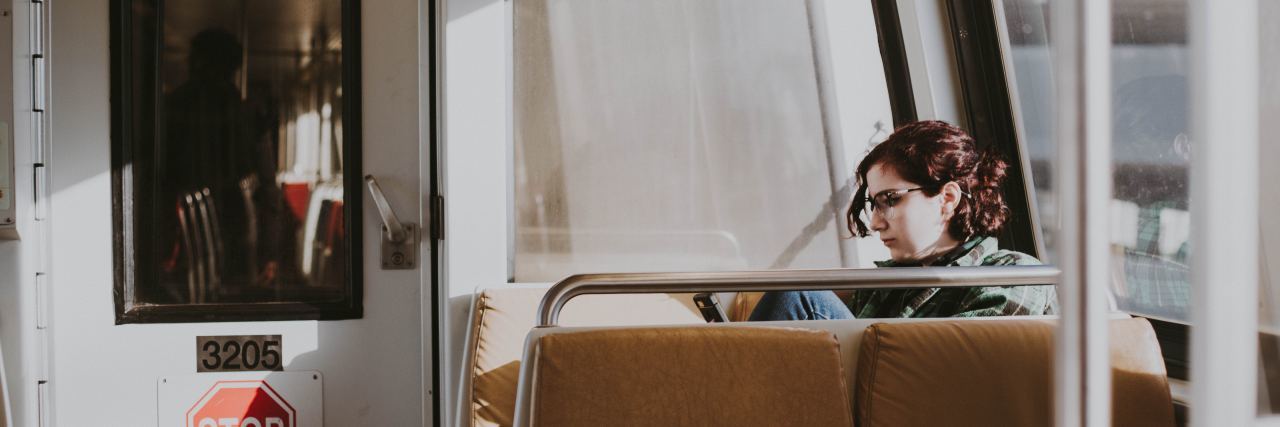Social anxiety is often classified as irrational fears stemming from social interactions. Due to the wide-ranging triggers and symptoms of my condition, I often encounter misconceptions when I try to open up to others about social anxiety. My social anxiety isn’t…
1. “Just stress.”
We’re all dealing with increasing stress in our lives. In my case, I am busy finishing my doctorate, freelance writing as my way of making a living and also being a mother. Sometimes, when I feel anxious in social situations, you might blame my busy schedule. Yes, I am stressed with all that’s on my plate, but such stressors don’t automatically create social anxiety. In fact, I had social anxiety long before entering graduate school and becoming a writer and mommy.
2. “Being shy.”
Shyness means that you might feel timid about socializing with others, but my social anxiety goes beyond feeling timid about meeting and talking with other people. Aside from being shy, I experience rapid heart rate, heavy breathing and sweating, along with stomach upset. I have to psyche myself up for hours — sometimes days — in advance of a social interaction to help put me at ease.
3. “Feeling tired.”
Social anxiety can be exhausting. Oftentimes, after a social event, I’m wiped out for the next day or two. Due to the exhaustion, you might incorrectly believe my social anxiety is just being tired and not having the energy to interact with others. On the contrary, it is this very interaction that’s causing the exhaustion—I might be pumped up beforehand and it goes unnoticed because the excitement is short-lived before I get tired.
4. “Just needing a break.”
I might miss out on different social events or sometimes cancel at the last minute. You might believe it’s due to the fact I just need a break from others. This is true to some extent, but rather than just “needing a break,” my brain is telling me to avoid certain situations that make me feel uncomfortable. Unfortunately, this creates a cycle of avoidance that can make my social anxiety worse over time, but once in a while, I can’t help giving in.
5. Me being “stuck-up.”
I love people. I love listening to stories and helping others. But, as mentioned above, I sometimes avoid social situations and appear standoffish. This can incorrectly portray me as being “stuck-up.” Compounding the problem is my fear of introducing myself to new people, which can make me seem disinterested in others. I will, however, introduce myself when someone else initiates the conversation.
6. Out of intentional rudeness.
In a social situation, I sometimes avoid making eye contact, and I’ll have my phone on hand for something to do to avoid making conversation. I might also panic in the middle of making small talk and need to get away. I do not mean to be rude — I just find many social interactions overwhelming.
7. A speech impairment.
When speaking in front of groups big and small, I tend to talk fast. I might also stutter and slur some of my words, or even accidentally skip some altogether. Sometimes words may be hard to come by, which can make my social anxiety worse because I think I’m being judged for not using the right words when I am, ironically, an English major. I do not have any particular speech impairment, though. Such symptoms are only temporary when my social anxiety flares up.
8. From a desire to be eternally alone.
Yes, I deal with social anxiety on a regular basis, which can translate into lots of alone time. However, I do not, in fact, wish to be alone forever. I am content with my family, and I love spending time with friends. I even like working out with my “gym buddies.” Rather than desiring to be alone, I choose to spend my time with others in moderation, always putting family first.
9. The same thing as being an introvert.
I am indeed an introvert, where I tend to recharge through single-person activities, such as reading, writing and working out. I’m also more observant than I am talkative. However, unlike introverts who simply prefer hanging out with fewer people, I can get anxiety in larger groups. I even become anxious when there’s too much talking going on in a small space because I don’t know how to navigate the situation and simply “join in.”
10. Being weak.
Social anxiety is far from being weak. During my teens and 20s, I was unable to identify my social anxiety and I often thought there was something wrong with me because everyone else seemed to navigate social situations far better than I could. Once I identified social anxiety at age 30, I have found ways to embrace my social anxiet, and to even acknowledge it as part of my personality. More importantly, I have built connections with others who have social anxiety, which has created a space to talk about our anxiety when we want to.
Photo by Annie Theby on Unsplash

